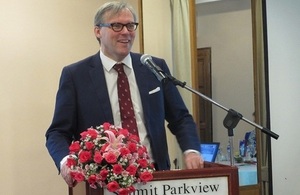Burma: Taking the conflict out of business
The UK is supporting attempts to make Burma’s economic development sustainable and inclusive.

British Ambassador Andrew Patrick, speaking at the opening of workshop on 'Conflict Sensitive Leadership and Governance’
Speaking at an event on ‘Conflict Sensitive Leadership and Governance’ that brought together representatives from government, business and civil society, British Ambassador Andrew Patrick emphasised the need of all parts of society to be involved in making the decisions that will determine Burma’s prosperity. He said:
This country is going through a period of tremendous change. The McKinsey Global Institute has predicted that Burma’s economy could grow by 300% in the next 10 years. This is potentially wonderful news. However, such change can also bring problems – that’s what this week’s workshop is all about.
This type of change can put strains on society, on ways of life, and on politics. If we look at the complex history of this country it is clear that it will be particularly challenging here. The advantage for Burma is that many of the neighbouring countries have been through this process, providing lesson to learn from.
Further information
The workshop on ‘Conflict Sensitive Economic Governance’ is being held in Rangoon from 25-29 November. It is being organised by the UK-based NGO International Alert, with support from the UK Government’s Prosperity Fund, and in collaboration with the Centre for Development Management and the Bridging Leaders Programme of the Asian Institute of Management. The British Embassy would also like to extend its thanks to Daw Khaing Khaing Nwe and the Union of Myanmar Federation of Chambers of Commerce and Industry (UMFCCI) for their support.
During the UK’s G8 Presidency we made a commitment to try and ensure that investment that comes to Burma should be sustainable, beneficial for local people, and ecologically sound. To help with this the UK government has supported the establishment of the Myanmar Centre for Responsible Business MCRB.
The UK is also working to ensure that Burma’s significant natural resources are shared fairly. We’re supporting Burma’s plans to join the Extractive Industries Transparency Initiative (EITI), so that revenues from natural resources such as oil and gas are transparent and accountable.
The UK is also trying to play a positive role in addressing conflict-related issues in Burma. Through UK Aid we are providing over £10 million in humanitarian assistance to those affected by conflict in Kachin state and over £10 million in humanitarian assistance to those affected by conflict in Rakhine state. More widely, over the next two years we are contributing over £40 million in support for conflict affected people and peace building country-wide.